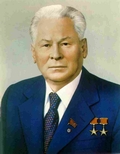| Born to a Russian peasant family in Siberia, Konstantin Černenko the Communist Party in 1931 during his army service. In 1933-1941 he headed department of propaganda and agitation in Novosyolovo and Uyar regions. In 1941-1943 Černenko was a secretary of the Krasnoyarsk regional party committee, but quit the job to study in the Higher School of Party Organizers, Moscow (1943-1945). He was sent to Penza as a secretary of party provincial committee in charge of propaganda and agitation (1945-1948). Then he was moved to Moldavia becoming head of agitation and propaganda department (1948-56), where he met Leonid Brežnev, who brought him to Moscow (1956) to head mass agitation section of agitation and propaganda department of the Central Committee. In May 1960 - July 1965 Černenko served as chief of the chancellery of the USSR Supreme Soviet Presidium. When Brežnev took over the party leadership, he made Černenko chief of the General Department (1965-1982). Elected a candidate member of the Central Committee (1966-1971) at the 23rd party congress, Černenko was promoted to full membership (1971-1985) at the 24th congress. In 1976 he was elected secretary (5 Mar 1976 - 13 Feb 1984) of the Central Committee and joined the Politburo as candidate member (3 Oct 1977 - 27 Nov 1978). Then he was quickly promoted to full membership (27 Nov 1978 - 10 Mar 1985). Černenko was considered a close associate of Brežnev, but after his death he was unable to rally a majority of the party factions behind his candidacy to be head of the party and lost out to Yury Andropov who became general secretary on 12 Nov 1982.Andropov's reforms targeted at eliminating corruption and cutting privileges in the higher party ranks estranged the party bureaucracy. In attempt to return to Brežnevism, the aging Politburo, of which seven members died in advanced age in 1982-1984, plumped for the conservative Černenko, who was elected (13 Feb 1984) general secretary following the death of Andropov on 9 Feb 1984. Deteriorating health of Černenko made him unfit to govern effectively. His frequent absences from official functions left little doubt that his election had been an interim measure. He died in office on 10 Mar 1985. Biography source: [3, p. 584] |

